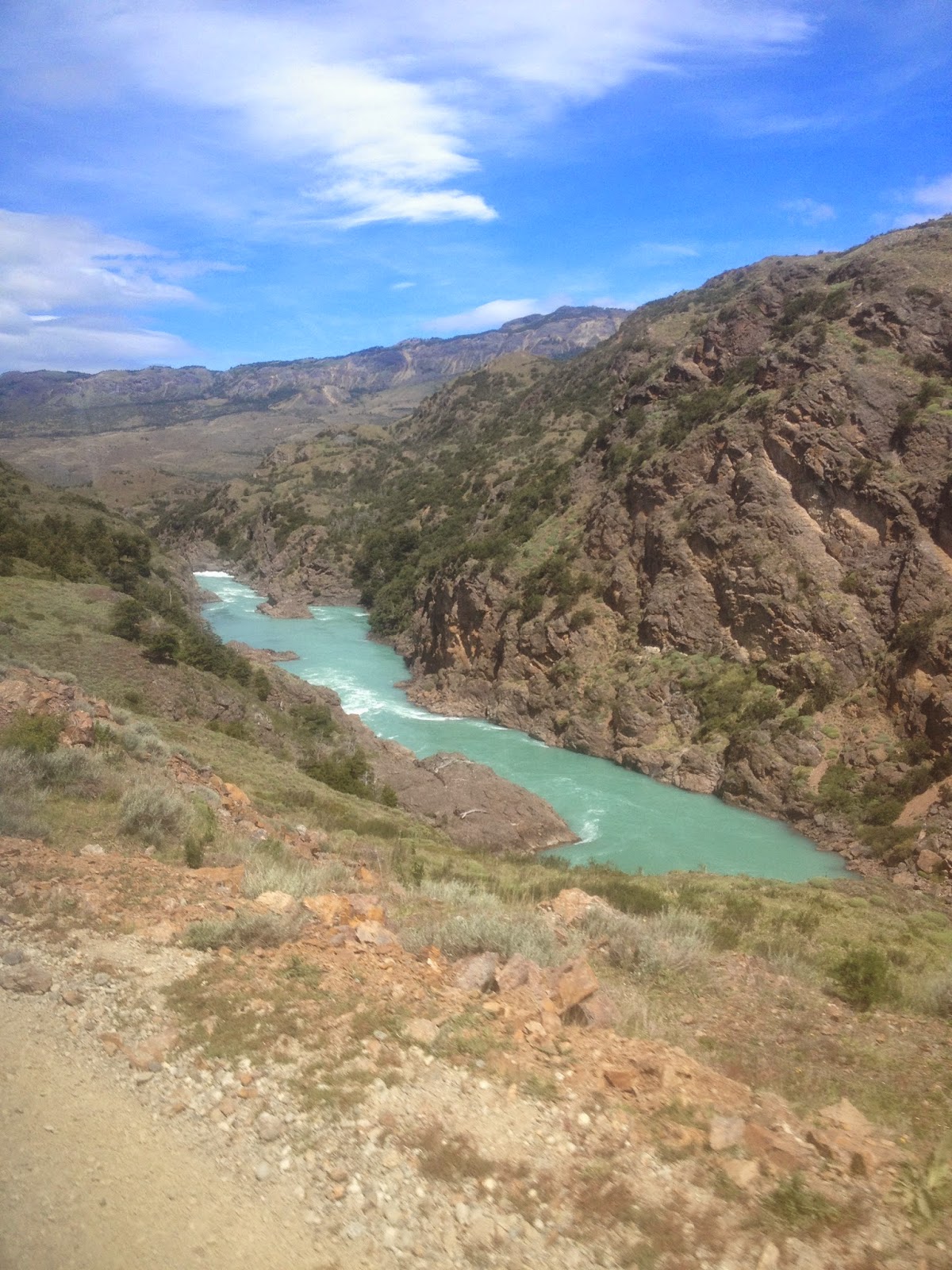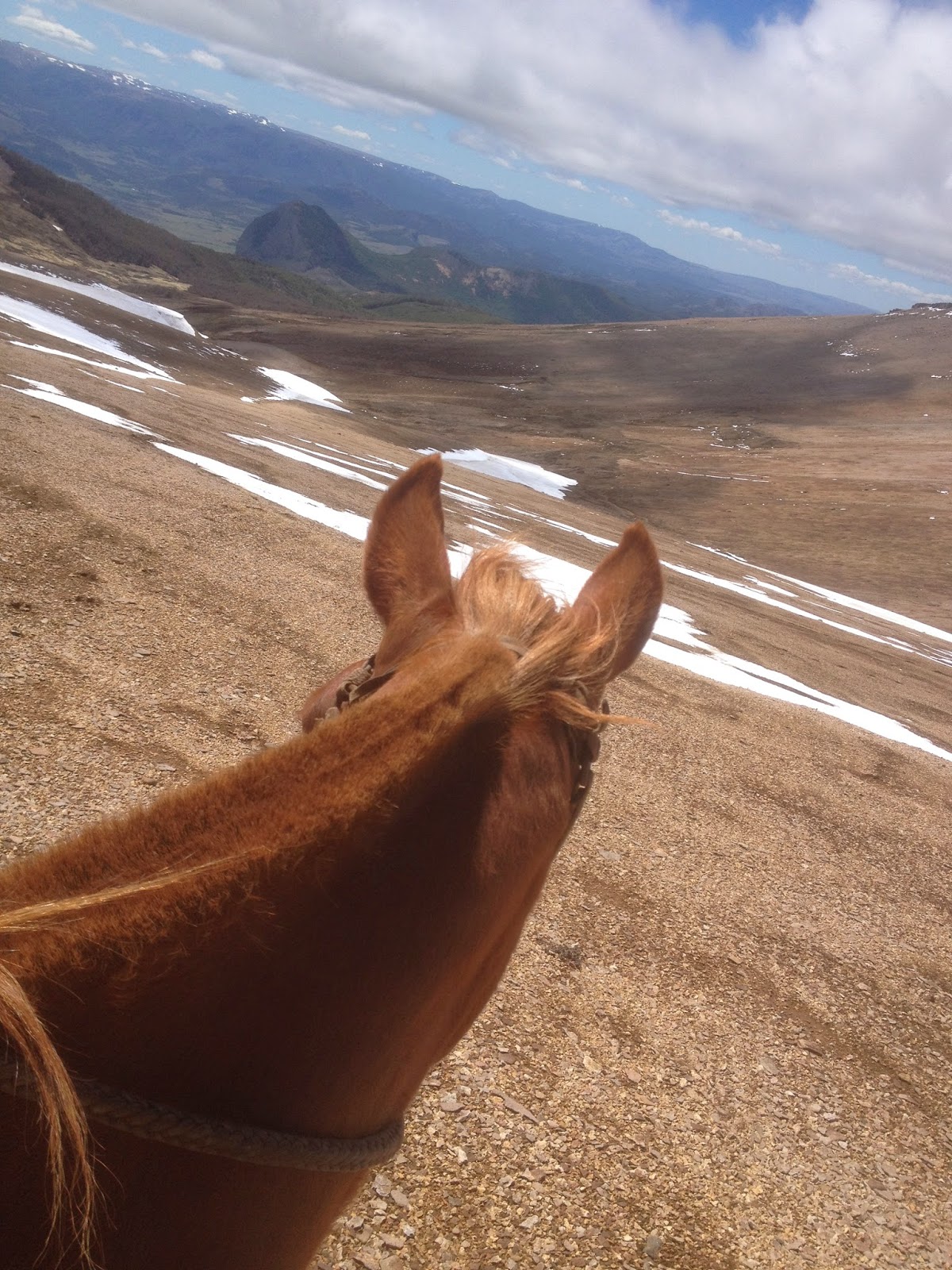I copy out mountains, rivers, clouds.
Welcome to Patagonia, Chile. Geographically, the 11th region- Aysen XI- of Chilean Patagonia, home to no more than 4,000 people in 42,095 square miles. To the north lie the Northern and Southern Icefields, and to the south, Antarctica. On a map, the west is marked by the flood of the Baker river's flow into the Pacific Ocean, and to the east, the Argentinian boarder.
This is the wildest place on Earth.
I take a pen from my pocket. I note down
The people who call Region Aysen home are proud, genuine people. They spend their days simply, sunset to sunrise in the harshest environment on Earth. They love their mountains, their rivers, their forests because they understand that these are their livelihood. They celebrate each day with bread and wine, of which they find it impossible to overindulge. They are the most generous group of people I've yet to know.
a bird in it's rising
The small farms that speckle the landscape are duro, strong, like the hardened hands that have worked their familial lands for years. They've roped and wrangled this turbulent earth until they know exactly how it feels, stained like blood on their palms.
Or a spider in its little silkworks.
Livestock have become a precious thing, always in constant battle with the unbridled elements- pumas, earthquakes, the never ceasing-winds. Farmers are finding it more and more difficult to maintain their traditional lifestyles in such isolation. Yet, they choose to remain.
Nothing else crosses my mind. I am air,
The river is their lifeline. The ancestral Baker river, the most powerful of all of Chile's water sources, runs south 170km from the east at the Argentine boarder. The Baker is the heart of Aysen, providing jobs and unaltered beauty to those lucky enough to call her banks home. The river is a mirror reflection of it's people: strong and running free- for now.
clear air, where the wheat is waving
Maykol and Luis operate a rafting outfitting service on the Baker. They run some of the rapids four and five times a day, discussing eagerly afterwards in excited Chilean slang how they can improve the ride. When the boat is packed up and wetsuits have been shed, they make sure the thank the Baker, both closing their eyes for a minute as they emerge dripping in turquoise water, knowing their free spirits would be lost without this river.
where a bird's flight moves me, the uncertain
fall of a leaf, the globular
eye of a fish, unmoving in the lake
In the 1970's under the military dictatorship of Pinochet, Chile lost national control of most of its resources, including water. The privatized companies that now control Chile's rivers span across continents. The United States hold rights to six rivers, triumphed only by Endesa, a company from Spain that has collaborated with Enel from Italy to create a mega-corporation: HidroAysen. They plan to build a series of five hydroelectric dams in Southern Patagonia, two of which would dam the Baker river.
the statues sailing in the clouds,
If HidroAysen were to succeed with the project, life in Aysen would be altered. The simplistic, traditional way of the people would not be able to compete with job offers and work on the dam site, and Aysen would be forced to modernize- losing a large piece of themselves in the process.
the intricate variations of the rain.
The area is biologically diverse, home to many endangered species and provides a large range of rare flora that were originally documented during Darwin's exploration in 1833. The trees are covered in 'Old Man's Beard', a lichen that grows as a sign of clean air and can create a sense of disorientation in the forests, as if Patagonia was endless.
Nothing else crosses my mind except
This is the last best place. This is rugged, unforgiving nature in tooth and claw. This is life in its rawest stage: pristine peaks that have never been climbed, terrain that has never seen a human footstep, where the darkest dreams persist and the brightest days uplift. This is Patagonia.
the transparency of summer, I sing only of the wind,
But to HidroAysen,
this is Patagonia.
This is Profit and Progress. This is energy and money to subsist copper mining in the Northern Atacama desert.

When HidroAysen looks out at this piece of land, they see charts, graphs, and plans for how they can commodify nature.
and history passes in its carriage,
Dam site number two- the Confluence. The Nef river rolls in from the west, the Cochrane from the northeast and the Baker, moves south. This is the point on the river with a maximum energy output that would generate more than 2,750 megawatts of power for the North. Despite it being a multi-million dollar project, the dams will come at a much greater cost.
collecting its shrouds and metals,
How can this strip of paint be that mighty river?
and passes, and all I feel is rivers.
These waters are home to the largest exportation of salmon in all of Chile, third largest on a global scale. The eco-tourism generated in this region is one of it's most profound economic contributions. Aysen claims to provide 'the best fly fishing in the world' and with the highest volume of water to land mass in Chile, it is easy to see why.
I stay alone with the spring.
If the dams are built, tributaries like this that provide income and habitat will first flood, then dry up from imbalance of flow, destroying much of the unique ecosystem that relies on this rivers persistence.
 Shepherd, shepherd, don't you know
Shepherd, shepherd, don't you know
The Baker fjords of Tortel, the most beautiful place I've ever stepped foot, will also dry up. Once dammed, the river will no longer reach the Pacific Ocean, causing massive ecosystemic shifts in not only the river, but smaller scale to the ocean's aquaculture as well.
they are all waiting for you?
Dam site number 1.
There is still hope in Chile. The Patagonian people are not handing over their rivers in peace. The Patagonia Sin Represas movement, a group of conservationalists who are fighting to keep the dams out of Aysen, has made waves in delaying HidroAysen's project by demanding adequate environmental impact reports, which must then be approved by the Chilean government, for both the mega-dams, as well as the 1,500 feet of accompanying transmission line that are needed to transport the energy to the North.
I know, I know. But here beside the water,
The transmission lines will run parallel to the river, and require more than 300 feet on either side of the cable to be deforested and stripped bare. In Spanish, they will become cicatrizes, scars on the face of this beautiful place.
while the locusts chitter and sparkle
The river's color is distinguished by the unique shade of blue in the glacial waters, unlike any river I've seen. The legend in the region says that her waters are colored as such because of a large deposit of gold in the glacial runoff. Some Chileans even fear an upcoming gold rush after the dam project brings more people and attention to the region.
 although they are waiting, I want to wait for myself.
although they are waiting, I want to wait for myself.
Here in Tortel, a small fishing town on the farthest tip of Aysen, the locals are all fishermen. The pueblo is connected purely by a series of hand built boardwalks that allow the boatsmen to dock on either the Pacific side or off of the Baker. Life is hard here, trade has become the predominate means of survival. Maria Jose sells menthol cigarettes by the carton, and trades for homemade bread or a rare ration of fresh fruit. The Chileans here are adamantly against the dam project because they will lose their jobs on the river and for many, this means their homes and lifestyle as well.
I too want to watch myself.
People won't be the only thing affected. The fauna of Aysen are some of the most rare in the world, including the condor, the blue-footed boobie, and the hooded grebe. Much of their habitat will flood as an effect of the dams, and they will significantly change their dietary trends by altering the migration of fish, particularly salmon and zebra fish, in the river system.
I want to discover at last my own feelings
Guanacos, vicuna and huemuls also share the benefits of the river, and have foraged in this area for centuries. Much of the land surrounding the dam sites is part of Conservacion Patagonica, a project run by Doug and Kristine Thompkins, American conservationists, to preserve land and habitat for these animals.
And when I reach the place where I am waiting,
The damming of this river puts much more in jeopardy than just the water. Every form of life in this area would be impacted, causing irreversible changes to the landscape and ancient ecosystems. This is not the first river to be dammed, nor will it be the last. We have seen the effects of our modernization, we have seen the effects of dams, yet still choose to sacrifice balance and harmony for progression and profit.

 I expect to fall asleep, dying of laughter. -P.N
I expect to fall asleep, dying of laughter. -P.N
The most beautiful places are dying. The last living Eden is about to be sacrificed. The Baker river will just be the beginning, and once it is dammed the Pascua river and the rest of Chile's abundant water sources will be quick to fall.
When does it stop? Where will it end?
 Patagonia Sin Represas
Patagonia Sin Represas
Pastoral
By Pablo Neruda
I copy out mountains, rivers, clouds.
I take my pen from my pocket. I note down
a bird in its rising
or a spider in its little silkworks.
Nothing else crosses my mind. I am air,
clear air, where the wheat is waving,
where a bird's flight moves me, the uncertain
fall of a leaf, the globular
eye of a fish unmoving in the lake,
the statues sailing in the clouds,
the intricate variations of the rain.
Nothing else crosses my mind except
the transparency of summer. I sing only of the wind,
and history passes in its carriage,
collecting its shrouds and metals,
and passes, and all I feel is rivers.
I stay alone with the spring.
Shepherd, shepherd don't you know
they are all waiting for you?
I know, I know, but here beside the water
while the locusts chitter and sparkle,
although they are waiting, I want to wait for myself.
I too want to watch myself.
I want to discover at last my own feelings.
And when I reach the place where I am waiting,
I expect to fall asleep, dying of laughter.
- The Poetry of Pablo Neruda, text 2003, pg. 484 - translated by Alastair Reid






























